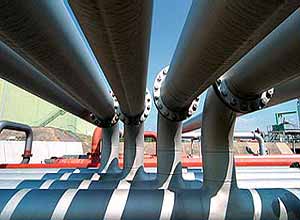January 16, 2008 (the date of publication in Russian)
Sergey Pravosudov
DISRUPTED DELIVERY IS AN UNWELCOME ALTERNATIVE
Europe fails to find more reliable gas suppliers than Russia
 Diversification of gas supplies is still on the table of European institutions. EU states are concerned about exhaustion of energy resources of their own and about increase of imports of "blue fuel" from Russia, fearing political dependence on Moscow. Meanwhile, numerous efforts to arrange alternative deliveries from Iran and Azerbaijan have not proven their reliability. In December 2007, Iran reduced gas exports to Turkey due to cold weather; in January, Tehran officials made clear that gas is required for domestic purposes. Eventually, Turkey had no other option but to address Russia – and Gazprom promptly increased deliveries.
Diversification of gas supplies is still on the table of European institutions. EU states are concerned about exhaustion of energy resources of their own and about increase of imports of "blue fuel" from Russia, fearing political dependence on Moscow. Meanwhile, numerous efforts to arrange alternative deliveries from Iran and Azerbaijan have not proven their reliability. In December 2007, Iran reduced gas exports to Turkey due to cold weather; in January, Tehran officials made clear that gas is required for domestic purposes. Eventually, Turkey had no other option but to address Russia – and Gazprom promptly increased deliveries.
Iran displays lack of reliability not for the first time. A year earlier, in December 2006, Turkey also ran short of gas because of an explosion on the major pipeline delivering gas from Iran.
Today, Tehran authorities are not going to bear responsibility for disruption of exports to Turkey. They are pointing at Turkmenistan. It is true that in December, Ashgabat ceased deliveries of gas across the border, and Tehran was forced to redirect the amounts reserved for Turkey, to the regions of Southern Iran, which used to be supplied from Turkmenistan (which, by the way, was also regarded as a probable alternative supplier of Europe).
A similar occasion affected Greece. In the end of the last year, Greek media highlighted a contract with Azerbaijan for delivery of gas via Georgia and Turkey. However, this route did not come into operation, and Athens, as well as Ankara, had to turn to Russia for assistance.
In order to establish stable delivery of gas to its long-time partner, Russia is boosting its activity in the direction of Southern Europe. Greece and Bulgaria are going to receive gas along a new underwater pipeline, South Stream. At the same time, Russian and Kazakh oil will be shipped along a new pipeline connecting Burgas and Alexandrupolis.
Azerbaijan's failure to provide alternative shipments is presently explained with technical difficulties in development of the Shah Deniz oil deposit on the Caspian shelf. Still, even after these technical problems are resolved, one deposit (from where Baku exports oil now only to Georgia and some provinces of Turkey) is unlikely to be sufficient to secure a substantial share at the European markets.
Therefore, it is becoming more and more obvious that Russia is going to remain Europe's major partner in gas trade. Amount of exported gas are going to increase with construction of the North Stream and South Stream across the bottoms of resp. the Baltic and the Black Sea.
While EU politicians go on speculating on the notorious diversification, professionals in energy trade are well convinced of necessity of partnership with Russia. On the background of Brussels ritual demagogy, European energy corporations are seeking new contracts with Russia's Gazprom.
Sergey Pravosudov is the Director of National Energy Institute, Moscow
Number of shows: 1193
 ENG
ENG 

 ENG
ENG 
